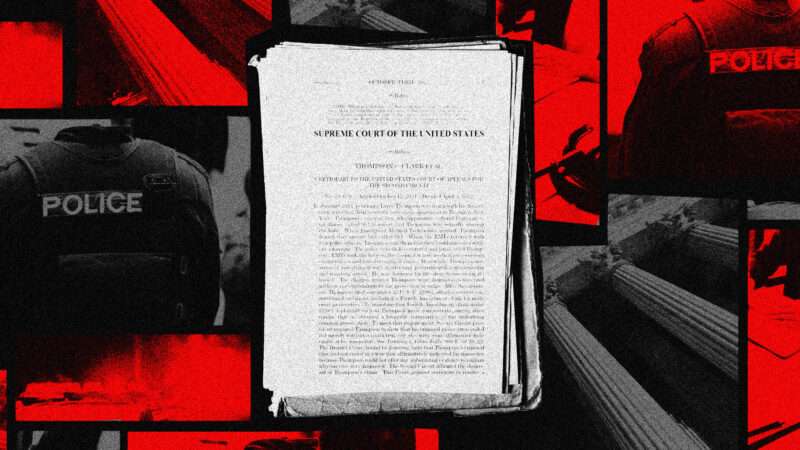
Police officers could frame people, file bogus charges, conjure evidence out of thin air—and, in most of the U.S., they would still be immune from facing any sort of civil accountability for that malicious prosecution. Until yesterday.
In January 2014, Larry Thompson's sister-in-law called 911 after noticing his baby had a rash. That call resulted in several police officers showing up at Thompson's Brooklyn apartment, entering without a warrant, arresting him when he objected to that, jailing him for two days, and charging him with obstructing governmental administration and resisting arrest after they allegedly lied about what happened.
The initial 911 call was bogus: Thompson's sister-in-law struggles with mental illness and assumed the mark was a sign of sexual abuse; an inspection at the hospital revealed it to be diaper rash. The charges resulting from that call were bogus as well; the prosecutor ultimately moved to dismiss them, and a trial judge closed the case.
Yet when Thompson attempted to sue the officers involved, he was barred by the U.S. Court of Appeals for the 2nd Circuit: In order to bring such a suit, victims were required to prove that false charges were dropped because the defendants in question had affirmatively proven their innocence.
Which is no feasible task. "When charges are dismissed, you generally have no opportunity to introduce evidence, let alone indicate your innocence," says Amir Ali, Executive Director of the MacArthur Justice Center and an attorney for Thompson.
Yesterday, the highest court in the country struck that requirement down, ruling that Thompson should indeed have a right to sue the officers at the center of his case. "A plaintiff such as Thompson must demonstrate, among other things, that he obtained a favorable termination of the underlying criminal prosecution," wrote Justice Brett Kavanaugh for the U.S. Supreme Court. "We hold that a Fourth Amendment claim…for malicious prosecution does not require the plaintiff to show that the criminal prosecution ended with some affirmative indication of innocence."
The absurdity of that standard was not lost on the court. "Requiring the plaintiff to show that his prosecution ended with an affirmative indication of innocence would paradoxically foreclose a…claim when the government's case was weaker and dismissed without explanation before trial, but allow a claim when the government's evidence was substantial enough to proceed to trial," wrote Kavanaugh. "That would make little sense."
It was an untenable status quo, says Marie Miller, an attorney with the Institute for Justice, a public interest law firm that filed an amicus brief in Thompson's case. It "just flipp[ed] the whole principle of innocent until proven guilty on its head," she tells Reason. "In criminal proceedings, they're designed with the presumption of innocence in place. Criminal proceedings aren't designed to allow a person to prove that they're innocent. Indications of innocence are very rare."
Whether Thompson will actually get to bring his suit before a jury is still far from guaranteed. He will have to convince the 2nd Circuit that cops lacked probable cause to arrest him, and he will have to overcome qualified immunity, the legal doctrine that shields state and local government actors from federal civil liability if there is no court precedent outlining the alleged misbehavior with a sort of crystalline exactitude. (An example: Two cops in Fresno, California, were shielded from a lawsuit after allegedly stealing $225,000 during the execution of a search warrant, because the plaintiffs could find no court ruling on the books that said stealing under such circumstances violates the Constitution.)
But Thompson and Ali have at least cleared one hurdle. "You have false charges potentially upending someone's life, whether it's being thrown in jail, losing a job, being forced to attend criminal hearings on false charges over the course of months," says Ali. "And then when they finally succeed in getting those charges dismissed, they're told that they have no recourse in federal court against the police officer who caused it all to happen."
Alleged victims of malicious prosecution will still face many barriers to getting before a jury. But, as of this week, such claims are no longer dead on arrival.
The post The Supreme Court Says You Can Sue Cops Who Frame You on False Charges appeared first on Reason.com.







